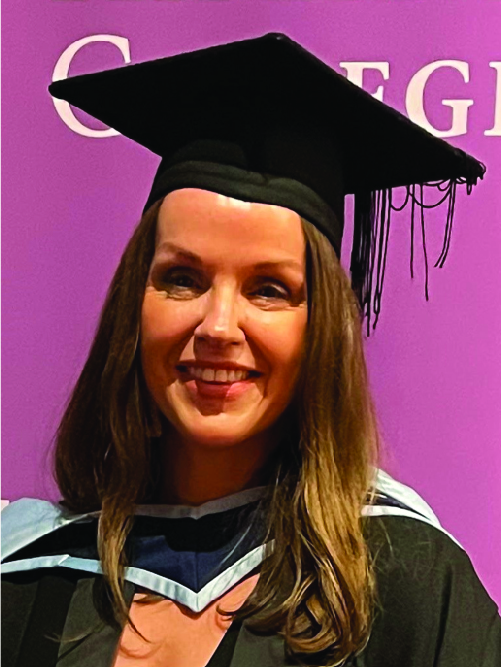
Research profile
Máire Toomey
PME in Post-Primary Education
During her time in development work, Máire developed a global citizenship education program, impacting Transition Year and Senior
Cycle students nationwide. This experience fuelled her dedication to education, emphasizing its transformative power. Her journey reflects her
commitment to fostering positive change through education.
Research Paper Title
Barriers to Second language Acquisition for Students With Dyslexia: A Practitioner Focused Study
Abstract
This study investigates the challenges to second language acquisition for students with dyslexia from a practitioner perspective. It is a small-scale, qualitative study. Through a series of five interviews with stakeholders in education at second level, it poses questions about best practice in supporting dyslexic students in the Modern Foreign Language (MFL) classroom. Through careful thematic analysis, the principal finding of the study was to identify a highly individualised approach to differentiation as the key to effective support. The study also identifies the main challenges in MFL teaching, including issues of time and teacher expertise, and recommends strategies that could be used to meet these challenges.
Biography
In 2023, Máire Toomey graduated with First Class Honours in the Professional Master of Education (PME) in Post-Primary Education from Hibernia College. She is also a graduate of UCD with an Honours degree in Spanish and Sociology. After living and teaching in Spain, she spent eight years in Financial Services in Ireland before venturing into entrepreneurship, owning her own business for five years. Máire then moved into the realm of global development. During her time in development work, Máire developed a global citizenship education program, impacting Transition Year and Senior
Cycle students nationwide. This experience fuelled her dedication to education, emphasizing its transformative power. Her journey reflects her
commitment to fostering positive change through education
Research motivation
Can you tell us a bit about your research project?
My research project explores the challenges faced by students with dyslexia in acquiring a second language in the post-primary setting. It aims to identify effective teaching interventions that can facilitate these students’ success in Modern Foreign Language (MFL) classrooms. Through qualitative methods, including interviews with teachers and educational experts, the study seeks to uncover practical strategies to support dyslexic students and to understand the current barriers to implementing these strategies effectively.
What motivated you to undertake this research?
The motivation for this research stemmed from my observations of the significant difficulties faced by dyslexic students in learning second languages, coupled with a lack of specific research on this issue within the Irish educational context. I wanted to contribute to a better understanding of these challenges and to identify effective, evidence-based teaching practices that could make a real difference in these students’ educational experiences and outcomes.
What impact has it had on your practice?
Conducting this research has profoundly impacted my teaching practice by increasing my awareness of the specific needs of dyslexic students in language learning. It has equipped me with a deeper understanding of effective intervention strategies and the importance of creating an inclusive classroom environment. This knowledge has enabled me to better support my students and advocate for more comprehensive training and resources for teachers in this area.
How important do you feel research will be in your future practice?
Research will continue to be crucial in my future practice as it provides a foundation for evidence-based teaching and continuous improvement. Staying informed about the latest studies and advancements in educational strategies will enable me to adopt best practices and to innovate in my teaching methods. Ongoing engagement with research ensures that I can effectively support all students, particularly those with special educational needs, in achieving their full potential.